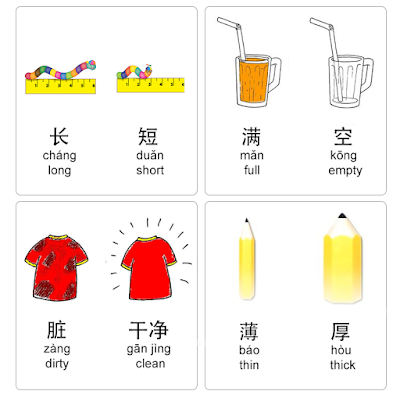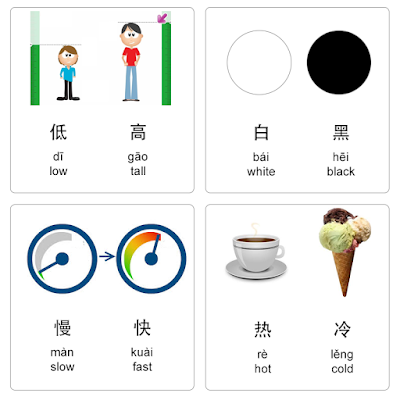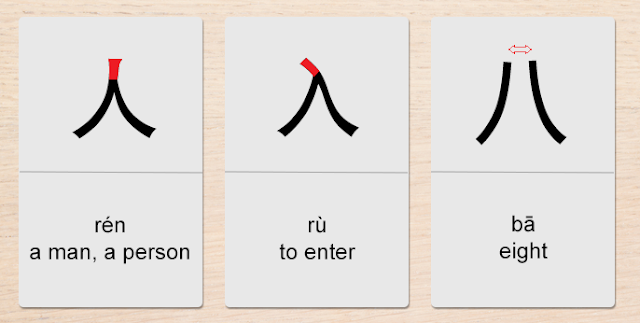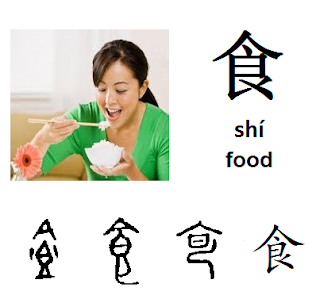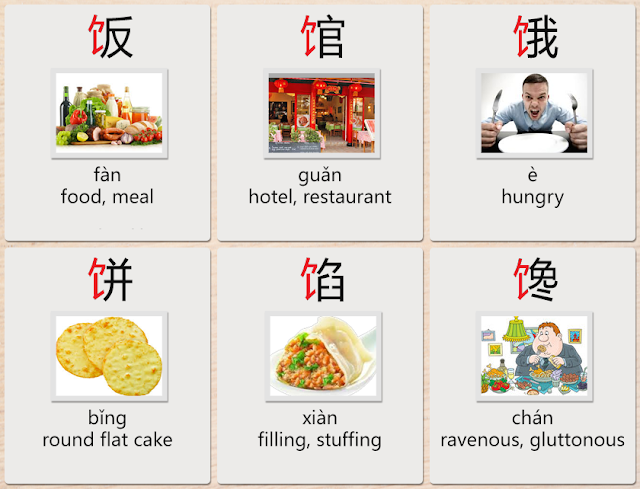31 May, 2015
30 May, 2015
Expressing Agreement / Approval In Chinese
1.
A: 你这条裤子脏了。
nǐ zhè tiáo kù zi zàng le
Your trousers are dirty.
B: 谁会注意我的裤子呢?
shuí huì zhù yì wǒ de kù zi ní
Who cares about my trousers?
A: 不行, 不行。
bù xíng bù xíng
It is not fine.
B: 好吧, 听你的, 我换条裤子。
hǎo ba tīng nǐ de wǒ huàn tiáo kù zi
OK, I'll do it as you suggest, I will change my trousers.
More dialogue samples:
29 May, 2015
28 May, 2015
Chinese Words Beginning With 双 (shuāng)
Remember that post about words beginning with 单 (dān)? Now it is time to compare the usage of 单 and 双!
双 (shuāng) is a another good example of a morpheme with strong word-building ability. As a prefix, it means “two-”, ”bi-”, “double”, etc.
双 (shuāng) is a another good example of a morpheme with strong word-building ability. As a prefix, it means “two-”, ”bi-”, “double”, etc.
27 May, 2015
Chinese Verbs For Taking Different Vehicles: 骑 / 坐 / 开
In Mandarin Chinese, the action of taking a vehicle of some kind is described with one of the verbs: 坐 (zuò), 骑 (qí) or 开 (kāi).
坐 (zuò) is mosty used for vehicles with seats (in which passengers can sit down), e. g., buses, ships, planes and trains.
骑 (qí) means "to straddle". This verb is used for bicycles, motorcycles and horses.
坐 (zuò) is mosty used for vehicles with seats (in which passengers can sit down), e. g., buses, ships, planes and trains.
骑 (qí) means "to straddle". This verb is used for bicycles, motorcycles and horses.
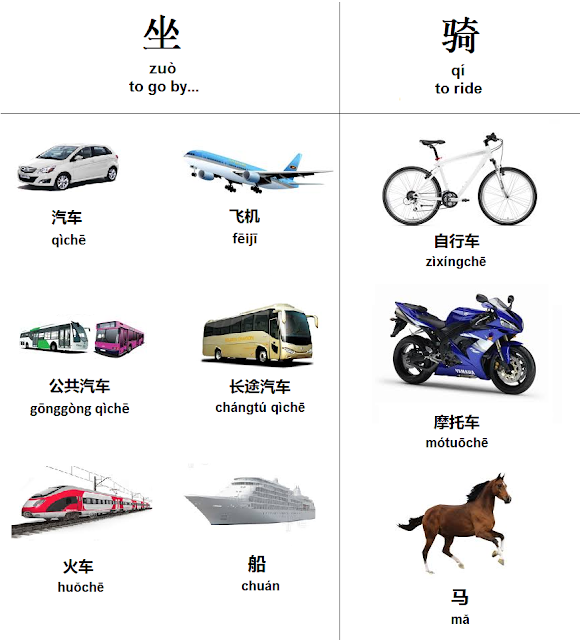 |
26 May, 2015
24 May, 2015
23 May, 2015
21 May, 2015
20 May, 2015
18 May, 2015
17 May, 2015
Mongolian Hot Pots – Chinese Regional Variations
 |
| 火锅 – huǒ guō – Mongolian hot pot |
火锅 – huǒ guō – Mongolian hot pot
At the center of the dining table, there is a big pot with broth that is kept simmering. Those participating in the dinner can take fresh ingredients and place them into the broth (using chopsticks). So, all food is cooked at the table. It is a very relaxing and pleasant experience.
In the vast majority of restaurants, the cooking pots are sunk into the table or, alternatively, hung above it. Gas and hot coals may be used as a fuel. Nowadays, inductor cookers are widely used.
16 May, 2015
Seeing The Dentist – Illustrated Phrasebook
我需要看牙医。– wǒ xū yào kàn yá yī – I need to see a dentist.
我想预约看牙医。– wǒ xiǎng yù yuē kàn yá yī – I would like to make an appointment to see the dentist.
尽快 – jǐn kuài – as soon as possible
情况十分紧急。 – qíng kuàng shí fēn jǐn jí – It is urgent.
开放时间是什么时候? – kāi fàng shí jiān shì shén me shí hòu – What are the opening hours?
我想预约看牙医。– wǒ xiǎng yù yuē kàn yá yī – I would like to make an appointment to see the dentist.
尽快 – jǐn kuài – as soon as possible
情况十分紧急。 – qíng kuàng shí fēn jǐn jí – It is urgent.
开放时间是什么时候? – kāi fàng shí jiān shì shén me shí hòu – What are the opening hours?
15 May, 2015
Chinese Opposite Words Game
小 – xiǎo – small
黑 – hēi – black
白 – bái – white
慢 – màn – slow
快 – kuài – fast
关 – guān – to close
开 – kāi – to open
高 – gāo – tall
低 – dī – low, short
热 – rè – hot
冷 – lěng – cold
便宜 – pián yí – cheap
贵 – guì – expensive
穷人 – qióng rén – a poor man
富人 – fù rén – a rich man
Play this Scatter game to test your knowledge of Chinese antonyms!
14 May, 2015
Words With 单
In the article about Chinese negative prefixes, it was already mentioned that Mandarin Chinese is rarely described as a language having prefixes. However, 单 (dān) is a good example of a meaningful morphem that has very strong word-building ability.
As a prefix, it usually means “one-”, “mono-”, ”uni-”, “single”, etc.
These are some commonly used words beginning with 单:
More examples:
These are some commonly used words beginning with 单:
More examples:
13 May, 2015
The Analects of Confucius: Sayings about Learning
三人行,必有我师。
sān rén xíng, bì yǒu wǒ shī
This well-known Chinese idiom is literally translated into English as "When I walk along with two others, from at least one I will be able to learn" (James Legge). Nowadays, this wise saying is commonly interpreted as "You have something to learn from everyone".
sān rén xíng, bì yǒu wǒ shī
This well-known Chinese idiom is literally translated into English as "When I walk along with two others, from at least one I will be able to learn" (James Legge). Nowadays, this wise saying is commonly interpreted as "You have something to learn from everyone".
12 May, 2015
5 Ways To Ask "Where Are You From?" In Chinese
The most common way to ask another person's nationality is as follows:
你是哪国人? – Nǐ shì nǎ guó rén? – What country are you from? (What is your nationality?)
The "pattern" of the answer:
Subject + 是 + Name of country + 人
E. g.,
我是英国人。 – Wǒ shì yīng guó rén. – I am from the UK. (I am Briton.)
她是德国人。 – Tā shì dé guó rén. – She is from Germany. (She is German.)
他是法国人。 – Tā shì fà guó rén. – He is from France. (He is French.)
我朋友是澳大利亚人。 – Wǒ péng yǒu shì ào dà lì yǎ rén. – My friend is from Australia. (My friend is Australian.)
马克是加拿大人。 – Mǎ kè shì jiā ná dà rén. – Mark is from Canada. (Mark is Canadian.)
你是哪国人? – Nǐ shì nǎ guó rén? – What country are you from? (What is your nationality?)
The "pattern" of the answer:
Subject + 是 + Name of country + 人
E. g.,
我是英国人。 – Wǒ shì yīng guó rén. – I am from the UK. (I am Briton.)
她是德国人。 – Tā shì dé guó rén. – She is from Germany. (She is German.)
他是法国人。 – Tā shì fà guó rén. – He is from France. (He is French.)
我朋友是澳大利亚人。 – Wǒ péng yǒu shì ào dà lì yǎ rén. – My friend is from Australia. (My friend is Australian.)
马克是加拿大人。 – Mǎ kè shì jiā ná dà rén. – Mark is from Canada. (Mark is Canadian.)
Alternative Ways To Ask "Where Are You From?" In Chinese
11 May, 2015
人 - 入 - 八
入 means "to enter", "to go into". Its pictogram resembles an arrowhead. In print, to distinguish 人 from 入 pay attention to the hook at top left.
人 means "a man". Therefore, its pictogram resembles human's legs. Though in print, the modern form of the character 人 has symmetric legs, its ancient version depicted a man with arms and asymmetric legs.
- How to distinguish 人 from 入 in handwriting?
- In 人 the right leg is shorter; in 入 the right leg is longer.
八 is composed of two strokes: 丿 and 乁.
These two bent lines are believed to signal "division".
Of all single-digit numbers, 8 can be divided by 2 the greatest number of times.
09 May, 2015
08 May, 2015
07 May, 2015
06 May, 2015
How To Say "Small" In Chinese?
Most Commonly Used Words For "Small"
小 is one of the first words you learn in Chinese. It means “small”, “little”, “minor” and is used in a wide array of contexts.这只狗很小。– zhè zhǐ gǒu hěn xiǎo – This dog is small.
在我的小的时候 – zài wǒ de xiǎo de shíhòu – when I was small (young)
这个机会是很小的。– zhè ge jī huì shì hěn xiǎo de – This opportunity is small.
Another popular way of describing something small is by negating the opposite. You can just say that the object is not big (不大).
不大的狗 – bú dà de gǒu – small dog
不大的机会 – bú dà de jī huì – small opportunity, little chance
05 May, 2015
Talking About Wu Xing
Wu Xing is the five-element theory of Chinese philosophy. It is a conceptual scheme that was once used to explain a wide array of natural and social phenomena, including interaction between human body organs and the properties of traditional Chinese drugs. The "Five Elements" are commonly described as an endless loop that influences people's fate and many other things.
04 May, 2015
Radical 饣 ("Eat", "Food")
饣 is used as a left Chinese radical. Its meaning is “food” or ”eat”. The productive phonetic is shí (shi2).
饣 is simplified from 食. The pictogram of the traditional form looks like an inverted mouth over a bowl of food (probably rice) on a stand. The current form is 人 + 良 but the lower part is more likely to be related to 皀 rather than to 艮.
Here are the most commonly used characters containing 饣:
03 May, 2015
02 May, 2015
01 May, 2015
Using 想 (xiǎng) To Express Desire
In Chinese language, 想 (xiǎng) basically means "to think", "to reckon" or "to miss", but it also acts as an auxiliary verb expressing modality.
In this case 想 is translated as "want to…" or "would like to…".
The grammar pattern is as follows:
Subject + 想(xiǎng) + Verb (Object)
The verb provides the main content of the clause, while 想 expresses the desire to do something.
Examples:
In this case 想 is translated as "want to…" or "would like to…".
The grammar pattern is as follows:
Subject + 想(xiǎng) + Verb (Object)
The verb provides the main content of the clause, while 想 expresses the desire to do something.
Examples:
Subscribe to:
Comments (Atom)





